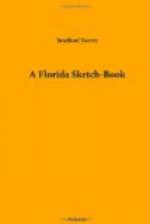When it came time to think of returning to St. Augustine, for dinner, I appreciated my cracker’s friendly warning against losing my way; for though I had hardly so much as entered the woods, and had taken, as I thought, good heed to my steps, I was almost at once in a quandary as to my road. There was no occasion for worry,—with the sun out, and my general course perfectly plain; but here was a fork in the road, and whether to bear to the left or to the right was a simple matter of guess-work. I made the best guess I could, and guessed wrong, as was apparent after a while, when I found the road under deep water for several rods. I objected to wading, and there was no ready way of going round, since the oak and palmetto scrub crowded close up to the roadside, and just here was all but impenetrable. What was still more conclusive, the road was the wrong one, as the inundation proved, and, for aught I could tell, might carry me far out of my course. I turned back, therefore, under the midday sun, and by good luck a second attempt brought me out of the woods very near where I had entered them.
I visited this particular piece of country but once afterward, having in the mean time discovered a better place of the same sort along the railroad, in the direction of Palatka. There, on a Sunday morning, I heard my first pine-wood sparrow. Time and tune could hardly have been in truer accord. The hour was of the quietest, the strain was of the simplest, and the bird sang as if he were dreaming. For a long time I let him go on without attempting to make certain who he was. He seemed to be rather far off: if I waited his pleasure, he would perhaps move toward me; if I disturbed him, he would probably become silent. So I sat on the end of a sleeper and listened. It was not great music. It made me think of the swamp sparrow; and the swamp sparrow is far from being a great singer. A single prolonged, drawling note (in that respect unlike the swamp sparrow, of course), followed by a succession of softer and sweeter ones,—that was all, when I came to analyze it; but that is no fair description of what I heard. The quality of the song is not there; and it was the quality, the feeling, the soul of it, if I may say what I mean, that made it, in the true sense of a much-abused word, charming.
There could be little doubt that the bird was a pine-wood sparrow; but such things are not to be taken for granted. Once or twice, indeed, the thought of some unfamiliar warbler had crossed my mind. At last, therefore, as the singer still kept out of sight, I leaped the ditch and pushed into the scrub. Happily I had not far to go; he had been much nearer than I thought. A small bird flew up before me, and dropped almost immediately into a clump of palmetto. I edged toward the spot and waited. Then the song began again, this time directly in front of me, but still far-away-sounding and dreamy. I find that last word in my hasty note penciled at the time, and can




